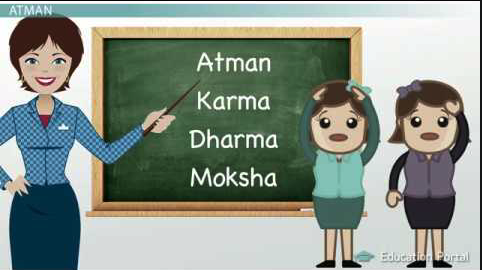Simple answers to your questions on Hinduism are provided here.
Use the search button (top right on desktop, top left on smartphones) to find specific topics of interest. At the bottom of each answer, check the “Tags” section for related topics. To learn more about this Q&A project, click [here].

On Hinduism
You can also download an earlier collection: 300QAs on Hinduism (PDF). Thank you.

13. Heaven and Hell
Sin is called Paap in Hinduism. Paap is an action to satisfy one’s senses and mind, and is therefore forbidden. Paap (sin) can be committed by mind, speech or body.
Thinking ill of others, pride and jealousy are sins committed by mind. Talking ill about others, speaking untruth, gossiping, blaming and finger pointing others are sins committed by speech. Killing living beings for mere sensual enjoyment, drinking alcohol, robbery, hitting people, eating condemned food, or any kind of violence to human beings, animals or living beings is sin committed by the body.
.
Other reading material:
Relevant videos: Swami Nikhil Anand Hinduism Q & A: What is Sin, Hinduism Q & A: Hell in Hinduism, is it the same as in Christianity?
Contributor: Geetha Ravula
Location of this post (13a): https://www.hinduspeakers.org/ufaqs/what-is-sin/
There is no eternal heaven or hell in Hinduism. Hell (naraka) and heaven (swarga) are a state of mind, brought about by our thoughts, and deeds. These states of mind result in a temporary astral orientation of the atman – naraka or swarga, wherefrom the next birth is determined.
The destiny of Hell or Heaven is NOT a permanent one in Hinduism. The soul or jeeva moves through even these worlds, based on the past karmas. When the results are exhausted, it moves on. Sometimes coming back to a human form.
Thus, in Hinduism, if we do good deeds (punya), we are rewarded with a bout in swarga. When the Credit Card balance runs out, we are kicked out. When too many sins (paapa) accumulated, we end up in naraka, where we are roasted like mirchi bajji (tempura). But that is also temporary.
The keeper of naraka is Yama Dharma Raaja, Lord of Justice, not a Satan of temptation or damnation.
.
Other reading material: Do Hindus believe in heaven or hell?
Relevant videos: Swami Nikhil Anand: Heaven in Hinduism, is it the same as in Christianity?, Hell in Hinduism, is it the same as in Christianity?, What is Sin,
Contributor: Madhu Kopalle
Location of this post (13b): https://www.hinduspeakers.org/ufaqs/do-hindus-believe-in-heaven-or-hell/
Moksha means liberation; it’s the concept of ultimate freedom from the cycle of life and death.
Hindus believe that there is no death for the soul or atman. When the soul leaves this body it passes through a cycle of successive lives. Its next incarnation is always dependent on past deeds. Without ultimate liberation, we reincarnate again and again in the form of human or any other living being. This cycle of life and death can only be broken when a soul attains Moksha.
Moksha is one of the human pursuits and it can be achieved when a human being pursues self-realization. It is achieved by ending false ego and desires. Moksha is attained only when all good and bad karmas of many lifetimes are exhausted and God is fully realized.
.
Other reading material: HAF: What is moksha?
Relevant videos: Swami Nikhil Anand Swami Nikhil Anand: What Is Liberation
Contributor: Geetha Ravula
Location of this post (13c): https://www.hinduspeakers.org/ufaqs/what-is-moksha/
According to Biblical scholar Bart Ehrmann, Jesus didn’t preach about Heaven or Hell. These are later interpolations and misunderstandings that are glorified in modern religious dialog.
Hindus do believe there is a “place of no-anxiety” (Vaikuntha), which is the highest realm and the home of Vishnu, the creator. This is the place of no-anxiety, as the name suggests, but we do not live there as our currently embodied selves. In the Hindu tradition, our current bodies are like clothing that we wear and discard, while our inner self, Atman, is the one that continues the onward journeys. Relationships made by this physical body are also considered, therefore, impermanent.
There are lower realms that correspond a little more closely with the modern Christian concept of heaven or hell, except we don’t have harps and virgins. These realms are also meant for enjoyment of the results of our actions (if good, you go to the higher realm, and if bad, well, no soup for you, and you go to the lower realm). But this isn’t permanent. When you have done your time, you can return back to this physical realm, and start counting up your deeds again.
Hindus are more likely to interpret Jesus’ teaching of the “Kingdom of God” (which he talked extensively about), as a reference to the heart filled with devotion (and not to heaven, as such). Hindus would agree that God lives in our hearts filled with love. And if you can find your way to your heart, you are in a place of no-anxiety, or heaven.
Welcome home, to your own heart!
.
Other reading material:
Relevant videos: Swami Nikhilanand Heaven in Hinduism, is it the same as in Christianity?, Hell in Hinduism, is it the same as in Christianity?, Bart Ehrmann’s interview on NPR
Contributor: Gaurav Rastogi
Location of this post (13d): https://www.hinduspeakers.org/ufaqs/is-heaven-in-hinduism-the-same-as-christianity/
